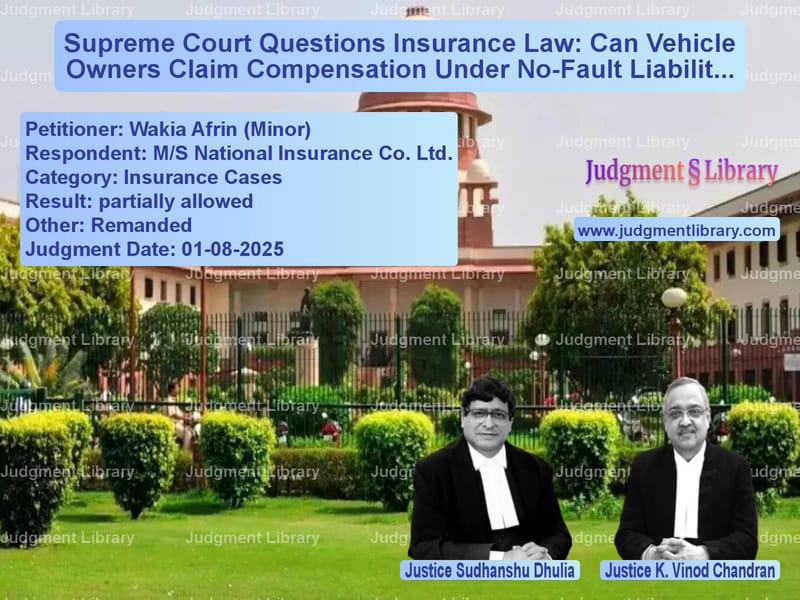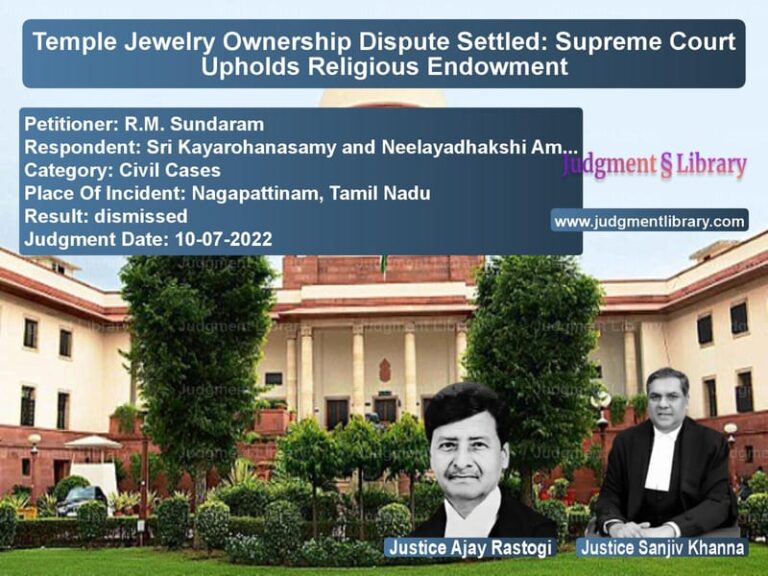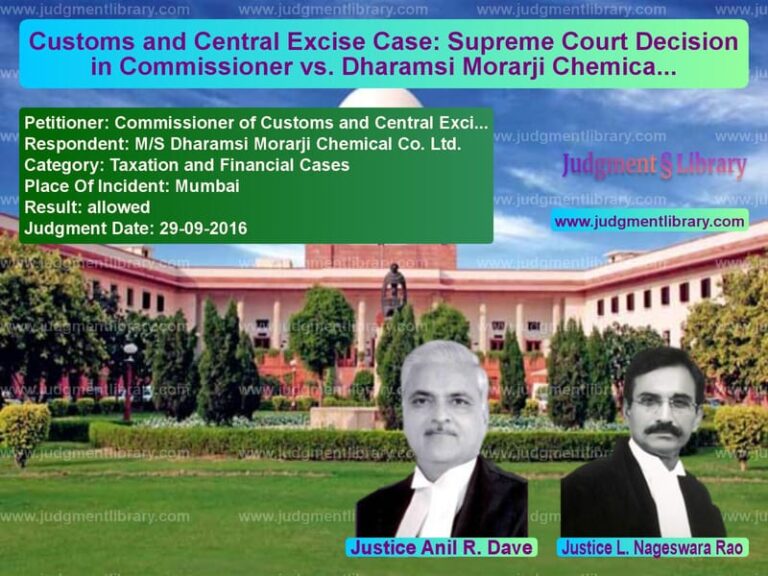Supreme Court Questions Insurance Law: Can Vehicle Owners Claim Compensation Under No-Fault Liability?
In a landmark judgment that could reshape motor accident compensation law in India, the Supreme Court has raised fundamental questions about whether vehicle owners and their families can claim compensation under the no-fault liability provision when they themselves are victims of accidents. The case involves a heartbreaking tragedy where a two-year-old girl lost both her parents in a motor vehicle accident and now faces legal hurdles in claiming compensation from the insurance company.
The tragic incident occurred when a vehicle dashed against a roadside building after going out of control due to a tyre burst. Four persons travelling in the vehicle died in the accident, including both parents of the petitioner, Wakia Afrin, who was just two years old at the time. The vehicle was owned by the petitioner’s father, who was also one of the victims. The young girl, represented by her aunt, filed a claim petition before the Motor Accident Claims Tribunal under Section 163A of the Motor Vehicles Act, 1988, which provides for compensation without requiring proof of negligence.
The MACT allowed the claim and awarded compensation of Rs. 4,08,000 for the death of the petitioner’s mother and Rs. 4,53,339 for the death of her father. However, the case took a complicated legal turn when it reached the High Court. The High Court found that a dead person cannot be made a defendant and hence declared the claim petitions not maintainable. This technical objection threatened to leave the orphaned child without compensation for the loss of both her parents.
The Supreme Court, comprising Justices Sudhanshu Dhulia and K. Vinod Chandran, began by addressing this preliminary objection. The court referred to Section 155 of the Motor Vehicles Act, which provides that even if the insured dies after the happening of an event which gave rise to a claim, it shall not be a bar to the survival of any cause of action arising out of the said event, against the insurer. The court observed: The event which gave rise to the claim is the accident and the death occurred after the event; albeit a direct result of the accident. A third party claim for compensation would definitely survive since, on the death of the insured it would lie against his estate, which the insurer has an obligation to indemnify. The insurer, hence, can defend any claim against the insured, which the insurer has the liability to indemnify in accordance with the policy issued. The ground stated by the High Court definitely is not tenable.
However, the court then turned to the more complex legal question that forms the heart of this case. The compelling contention of the Insurance Company is that the petitioner who is the sole heir of the owner, having succeeded to the estate of the owner of the vehicle who died in the accident cannot at the same time, be the person who has the liability and the recipient of the compensation. The liability to compensate on the death of the owner falls on his estate; which the claimant succeeds to and there cannot be any further compensation on the loss of dependency, is the argument.
The court examined a series of previous judgments on this issue, beginning with Dhanraj v. New India Assurance Co. Ltd., which found that an Insurance Policy under Section 147 of the Act does not require the insurer to assume the risk of death or injury on the body of the owner of the vehicle, since the policy issued only indemnifies the insured against liabilities incurred towards a third person or in respect of damages to property. The court also considered Oriental Insurance Co. Ltd. v. Jhuma Saha, which dealt with a claim under Section 166 of the Act by an owner-driver who suffered injuries, and Rajni Devi’s case which specifically addressed Section 163A claims.
In Rajni Devi’s case, the court had held that under Section 163A of the Act the liability is on the owner of the vehicle and a person cannot be both ‘the claimant and also a recipient’; presumably meaning the same individual who has the liability cannot be the recipient of the compensation. This principle has been followed in several subsequent cases, creating a consistent line of precedent that restricts no-fault liability claims to third parties only.
However, the Supreme Court in the present case expressed serious doubts about this interpretation. The judges made a crucial observation about the special nature of Section 163A: We cannot but notice that Section 163A is a special provision brought in, which is a non-obstante clause which overrides not only the entire provisions of the Motor Vehicles Act, 1988 but also any other law for the time being in force and any instrument having the force of law. We cannot but understand the non-obstante clause having a superseding effect over the laws of insurance or even the terms in the policy, which definitely is an instrument having the force of law.
The court further elaborated on the transformative nature of Section 163A: It has also to be noticed that Section 163A makes liable the owner of the vehicle or the authorized insurer to pay in accordance with the IInd Schedule in the case of death or permanent disablement due to the accident arising out of the use of a motor vehicle. Trite is the principle that the liability with respect to an accident is on the tortfeasor and in the case of a motor vehicle accident if the tortfeasor is the driver, the owner has the vicarious liability, which liability is indemnified by the insurer, when there is a valid policy. The liability is essentially of the owner but the provision, in addition to the insured/owner makes liable the authorized insurer too.
The court then made a significant observation that challenges the established interpretation: Hence, when there is a valid policy issued in the name of the vehicle involved in the accident, a claim under Section 163A, as per the words employed in the provision, according to us covers every claim and is not restricted to a third party claim; without any requirement of establishing the negligence, if death or permanent disability is caused by reason of the motor accident. This would also take in the liability with respect to the death of an owner or a driver who stepped into the shoes of the owner, if the claim is made under Section 163A dehors the statutory liability under Section 147 or the contractual liability as reduced to writing in an insurance policy.
The court emphasized the beneficial nature of Section 163A: It would override the provisions under Sections 147 & 149 along with the other provisions of the M.V. Act and the law regulating insurance as also the terms of the policy confining the claim with respect to an owner-driver to a fixed sum. This according to us is the intention of incorporating the non-obstante clause under Section 163A providing for no-fault liability claims, the compensation for which is restricted to the structured formula under the IInd Schedule. It is a beneficial piece of legislation brought in, keeping in mind the enhanced chances of an accident, resulting from the prevalence of vehicles in the overcrowded roads of today. It was a social security scheme, brought about considering the need for a more comprehensive scheme of ‘no-fault’ liability for reason of the ever-increasing instances of motor vehicle accidents and the difficulty in proving rash and negligent driving.
However, recognizing the significance of the legal question and its potential impact on insurance law, the court decided to refer the matter to a larger bench. The judges noted: We are of the opinion that this issue concerning the liability of the insurer in a claim under Section 163A qua the owner/insured requires an authoritative pronouncement. The dictum arising from the various decisions of different benches of two Judges is that the claim under Section 163A is restricted to third party risks, which, with all the respect at our command, we are unable to agree with.
The court acknowledged the tension between the statutory framework and judicial precedents: We are conscious that the provision, Section 163A, appears under the Chapter with the heading ‘Insurance of Vehicles Against Third Party Risks’, but, as we observed the non-obstante clause is in suppression of the entire Act, the other laws in force and any instrument valid in law.
In its concluding remarks, the court summarized its position: We have, herein above doubted, with due respect, the decisions of co-ordinate Benches of two Judges which now will have to be placed before a larger Bench. We direct the Registry to place the matter before the Hon’ble the Chief Justice of India for appropriate orders.
This judgment represents a significant moment in Indian insurance law, as it questions the long-standing interpretation that restricts no-fault liability claims to third parties only. The Supreme Court’s reasoning suggests that Section 163A, with its non-obstante clause, was intended to provide a comprehensive social security scheme for all victims of motor accidents, regardless of whether they are third parties or vehicle owners themselves. The case now awaits consideration by a larger bench, and its eventual outcome could have far-reaching implications for how insurance companies handle claims involving owner-drivers and their families.
Petitioner Name: Wakia Afrin (Minor).Respondent Name: M/S National Insurance Co. Ltd..Judgment By: Justice Sudhanshu Dhulia, Justice K. Vinod Chandran.Judgment Date: 01-08-2025.Result: partially allowed.
Don’t miss out on the full details! Download the complete judgment in PDF format below and gain valuable insights instantly!
Download Judgment: wakia-afrin-(minor)-vs-ms-national-insuran-supreme-court-of-india-judgment-dated-01-08-2025.pdf
Directly Download Judgment: Directly download this Judgment
See all petitions in Motor Insurance Settlements
See all petitions in Third-Party Insurance
See all petitions in Insurance Settlements
See all petitions in Compensation Disputes
See all petitions in Judgment by Sudhanshu Dhulia
See all petitions in Judgment by K. Vinod Chandran
See all petitions in partially allowed
See all petitions in Remanded
See all petitions in supreme court of India judgments August 2025
See all petitions in 2025 judgments
See all posts in Insurance Cases Category
See all allowed petitions in Insurance Cases Category
See all Dismissed petitions in Insurance Cases Category
See all partially allowed petitions in Insurance Cases Category







